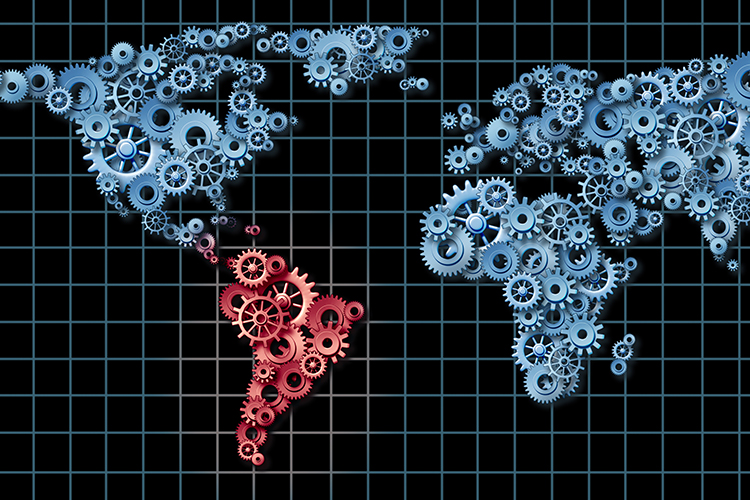
Latin America was the focus of a recent address in the Bradley Distinguished Lecture Series featuring Dr. Sebastian Edwards, a foremost expert on the Latin American economy who described the region’s “enormous potential” and “distinctive challenges.”
Edwards is the Henry Ford II Chair in International Management at the UCLA Anderson School of Management and a former chief economist for the Latin America and Caribbean region of the World Bank.
His remarks covered an array of economic, social, and political topics related to the “very heterogeneous” region, citing particularly the rise of the Chilean economy over the last 30 years as it put market-oriented policies into place, while the Venezuelan economy has plummeted under populist economic policies, with GDP per capita falling from almost $17,000 in 1986 to less than $10,000 in 2018.
That said, as a region with a large middle class within its total population of 680 million people, Edwards believes that key economic indicators such as currency values, growth, inflation, and public debt are relatively positive. For example, on the inflation front– a historically huge problem in Latin America – the region is currently faring better than the United States. Also, its debt to GDP ratio stands at about 68% compared to 120% in the post-pandemic U.S., admittedly due in part to its comparatively limited borrowing opportunities.
One significant longer-term advantage for the future of the region lies in its resources and structural strengths, said Edwards. As the world pursues its quest for clean energy, Latin America will be part of “a very bright future.”
Specifically, he said that solar energy potential in the Chilean north desert exceeds that of the Sahara, and wind energy potential south of Patagonia (the southernmost tip of the continent) is exceptional. In terms of other natural resources, 43% of the world’s lithium reserves can be found in Chile and Argentina, there are significant cobalt deposits in Brazil, and Chile and Peru combined account for 50% of the world’s copper production.
While there are very real logistical challenges to getting these resources to consumption centers, one of the world’s economic superpowers – China – is already staking a claim in the region.
“The U.S. is not doing much. We need to be paying more attention,” Edwards advised.
Something important to watch is the current “pink wave” of left-of-center leaders in the region, who now govern a majority of Latin American countries including all of the most populous states. Despite the region’s large middle class, there is a significant amount of income inequality and a growing number of people demanding improvement and a turn away from market-oriented policies. Edwards said that the “disastrous” results of earlier macroeconomic populism in the region should serve as a cautionary tale.
Despite these challenges, Edwards projects economic growth in most of Latin America over the next four years.
“Yes, Latin America is a sleeping giant,” Edwards concluded. “But we don’t just need him to wake up, we need him to get up.”
Edwards is also research associate of the National Bureau of Economic Research. Previously, he has been a consultant to a number of multilateral institutions, including the Inter-American Development Bank, the World Bank, the IMF and the OECD. Born in Santiago, Chile, Edwards earned his PhD in economics from the University of Chicago.
The Bradley Distinguished Lecture Series is sponsored by The Lynde and Harry Bradley Foundation and features internationally respected scholars, policy experts, and thought leaders who provide important insights into economic policies and actions that reinforce people’s faith in American democratic capitalism and free enterprise, and foster America’s global economic competitiveness, entrepreneurialism and innovation.
Sebastian Edwards has authored a forthcoming book, The Chile Project: The Story of the Chicago Boys and the Downfall of Neoliberalism, a behind-the-scenes history of the spread and consequences of the free-market thinking that dominated economic policymaking around the world in the second half of the twentieth century, but is now on the retreat.
